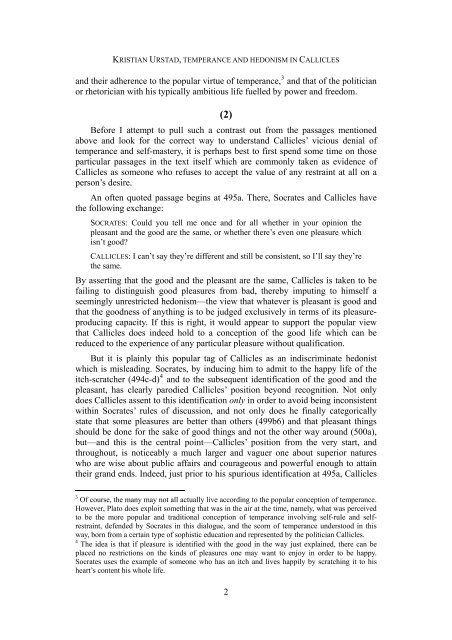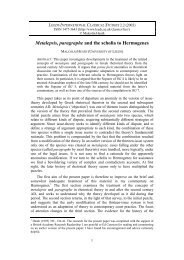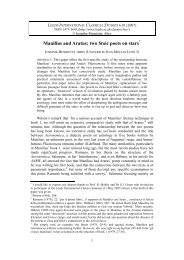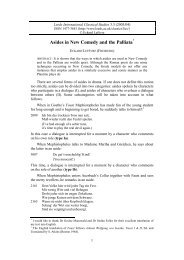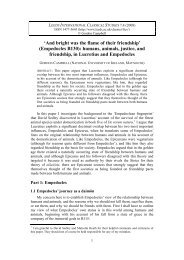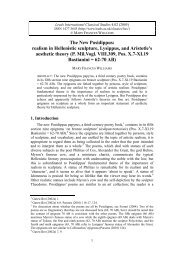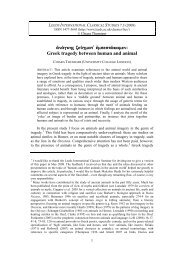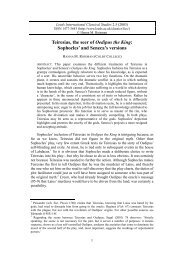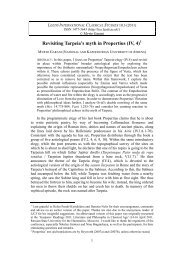The question of temperance and hedonism in Callicles - Leeds ...
The question of temperance and hedonism in Callicles - Leeds ...
The question of temperance and hedonism in Callicles - Leeds ...
You also want an ePaper? Increase the reach of your titles
YUMPU automatically turns print PDFs into web optimized ePapers that Google loves.
KRISTIAN URSTAD, TEMPERANCE AND HEDONISM IN CALLICLES<br />
<strong>and</strong> their adherence to the popular virtue <strong>of</strong> <strong>temperance</strong>, 3 <strong>and</strong> that <strong>of</strong> the politician<br />
or rhetorician with his typically ambitious life fuelled by power <strong>and</strong> freedom.<br />
(2)<br />
Before I attempt to pull such a contrast out from the passages mentioned<br />
above <strong>and</strong> look for the correct way to underst<strong>and</strong> <strong>Callicles</strong>’ vicious denial <strong>of</strong><br />
<strong>temperance</strong> <strong>and</strong> self-mastery, it is perhaps best to first spend some time on those<br />
particular passages <strong>in</strong> the text itself which are commonly taken as evidence <strong>of</strong><br />
<strong>Callicles</strong> as someone who refuses to accept the value <strong>of</strong> any restra<strong>in</strong>t at all on a<br />
person’s desire.<br />
An <strong>of</strong>ten quoted passage beg<strong>in</strong>s at 495a. <strong>The</strong>re, Socrates <strong>and</strong> <strong>Callicles</strong> have<br />
the follow<strong>in</strong>g exchange:<br />
SOCRATES: Could you tell me once <strong>and</strong> for all whether <strong>in</strong> your op<strong>in</strong>ion the<br />
pleasant <strong>and</strong> the good are the same, or whether there’s even one pleasure which<br />
isn’t good?<br />
CALLICLES: I can’t say they’re different <strong>and</strong> still be consistent, so I’ll say they’re<br />
the same.<br />
By assert<strong>in</strong>g that the good <strong>and</strong> the pleasant are the same, <strong>Callicles</strong> is taken to be<br />
fail<strong>in</strong>g to dist<strong>in</strong>guish good pleasures from bad, thereby imput<strong>in</strong>g to himself a<br />
seem<strong>in</strong>gly unrestricted <strong>hedonism</strong>—the view that whatever is pleasant is good <strong>and</strong><br />
that the goodness <strong>of</strong> anyth<strong>in</strong>g is to be judged exclusively <strong>in</strong> terms <strong>of</strong> its pleasureproduc<strong>in</strong>g<br />
capacity. If this is right, it would appear to support the popular view<br />
that <strong>Callicles</strong> does <strong>in</strong>deed hold to a conception <strong>of</strong> the good life which can be<br />
reduced to the experience <strong>of</strong> any particular pleasure without qualification.<br />
But it is pla<strong>in</strong>ly this popular tag <strong>of</strong> <strong>Callicles</strong> as an <strong>in</strong>discrim<strong>in</strong>ate hedonist<br />
which is mislead<strong>in</strong>g. Socrates, by <strong>in</strong>duc<strong>in</strong>g him to admit to the happy life <strong>of</strong> the<br />
itch-scratcher (494c-d) 4 <strong>and</strong> to the subsequent identification <strong>of</strong> the good <strong>and</strong> the<br />
pleasant, has clearly parodied <strong>Callicles</strong>’ position beyond recognition. Not only<br />
does <strong>Callicles</strong> assent to this identification only <strong>in</strong> order to avoid be<strong>in</strong>g <strong>in</strong>consistent<br />
with<strong>in</strong> Socrates’ rules <strong>of</strong> discussion, <strong>and</strong> not only does he f<strong>in</strong>ally categorically<br />
state that some pleasures are better than others (499b6) <strong>and</strong> that pleasant th<strong>in</strong>gs<br />
should be done for the sake <strong>of</strong> good th<strong>in</strong>gs <strong>and</strong> not the other way around (500a),<br />
but—<strong>and</strong> this is the central po<strong>in</strong>t—<strong>Callicles</strong>’ position from the very start, <strong>and</strong><br />
throughout, is noticeably a much larger <strong>and</strong> vaguer one about superior natures<br />
who are wise about public affairs <strong>and</strong> courageous <strong>and</strong> powerful enough to atta<strong>in</strong><br />
their gr<strong>and</strong> ends. Indeed, just prior to his spurious identification at 495a, <strong>Callicles</strong><br />
3 Of course, the many may not all actually live accord<strong>in</strong>g to the popular conception <strong>of</strong> <strong>temperance</strong>.<br />
However, Plato does exploit someth<strong>in</strong>g that was <strong>in</strong> the air at the time, namely, what was perceived<br />
to be the more popular <strong>and</strong> traditional conception <strong>of</strong> <strong>temperance</strong> <strong>in</strong>volv<strong>in</strong>g self-rule <strong>and</strong> selfrestra<strong>in</strong>t,<br />
defended by Socrates <strong>in</strong> this dialogue, <strong>and</strong> the scorn <strong>of</strong> <strong>temperance</strong> understood <strong>in</strong> this<br />
way, born from a certa<strong>in</strong> type <strong>of</strong> sophistic education <strong>and</strong> represented by the politician <strong>Callicles</strong>.<br />
4 <strong>The</strong> idea is that if pleasure is identified with the good <strong>in</strong> the way just expla<strong>in</strong>ed, there can be<br />
placed no restrictions on the k<strong>in</strong>ds <strong>of</strong> pleasures one may want to enjoy <strong>in</strong> order to be happy.<br />
Socrates uses the example <strong>of</strong> someone who has an itch <strong>and</strong> lives happily by scratch<strong>in</strong>g it to his<br />
heart’s content his whole life.<br />
2


